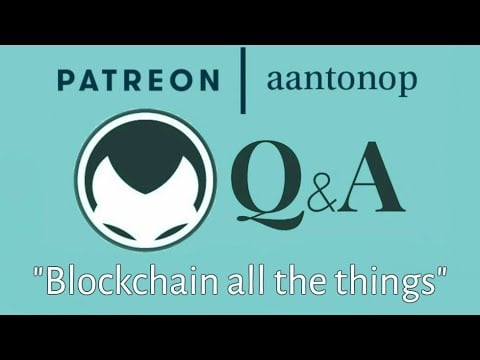Can blockchains help IoT security issues? Should we use ERC-20 token to trade solar energy? Can blockchains help with securities and prediction markets? Transport and logistics projects? Supply chain? Vehicular communications? Digital identities? Voting and election processes? Since there is such a proliferation of tokens, when will they reach the implementation stage? Ideas are cheap. Without ethics, tech can be dangerous.
These questions were from the sixth session of MOOC 11 and the Seoul Bitcoin Meetup, which took place on March 7th and April 5th 2019, respectively. If you want early-access to talks and a chance to participate in the monthly live Q&As with Andreas, become a patron: https://www.patreon.com/aantonop
RELATED:
The Lion and the Shark: Divergent Evolution in Cryptocurrency – https://youtu.be/d0x6CtD8iq4
Investing in Education instead of Speculation – https://youtu.be/6uXAbJQoZlE
Ethereum, ICOs, and Rocket Science – https://youtu.be/OWI5-AVndgk
Slush17 Panel: Farewell to Centralised Data – https://youtu.be/ul0aGzF-v5c
Blockchain vs. Bullshit: Thoughts On The Future of Money – https://youtu.be/SMEOKDVXlUo
Why I’m writing ‘Mastering Ethereum’ – https://youtu.be/So6WERp7vLY
What is Metropolis? – https://youtu.be/nmGu2mCpm90
Smart contract platforms – https://youtu.be/XU8Bc5oxneE
Smart contracts, sidechains, and the Lightning Network – https://youtu.be/wfxticQHvaw
Impact of smart contracts on law and accounting – https://youtu.be/K-TRzuPwJCc
Key management and inheritance – https://youtu.be/W3XADagE6P8
How do smart contracts work? – https://youtu.be/DyAjgkwwgyI
The legality of smart contracts – https://youtu.be/eKfnmxSmVF0
Smart contracts and law ambiguity – https://youtu.be/V4VVnWY4lIM
Scaling decentralized organisation – https://youtu.be/cuy03un7gfU
Governance scalability and asymmetric power – https://youtu.be/DUZ5nhW3smw
Governance and setting bad precedent – https://youtu.be/xjoTeG8D3CE
What is an archival node? – https://youtu.be/blyAg4mNS60
Gas and resource allocation – https://youtu.be/HwUJIGlHFes
Intrinsic vs. extrinsic assets – https://youtu.be/KDtfFNZy9xg
Altcoins and specialisation – https://youtu.be/b_Yhr8h6xnA
Ether, ICOs, and securities – https://youtu.be/guBNLSsnAiA
Unstoppable code – https://youtu.be/AQx3E3F8Kz4
Airdrop coins and privacy implications – https://youtu.be/JHRnqJJ0rhc
Initial coin offerings (ICOs) – https://youtu.be/Q5R8KuxV4A0
The token ICO explosion – https://youtu.be/vdaW8NtJXuQ
‘Coin’ and ‘token’ terminology – https://youtu.be/WjWkttUkm58
ICOs and responsible investment – https://youtu.be/C8UdbvrWyvg
ICOs and financial regulation – https://youtu.be/Plu_WX3Gs8E
ICOs, disruption, and self-regulation – https://youtu.be/yfjgcI8xX3A
Scams, gambling, and regulation – https://youtu.be/fTI88YrN1UE
ICOs and pyramid schemes – https://youtu.be/8HYWWP1QU7Q
Directed acyclic graphs (DAGs) and IOTA – https://youtu.be/lfgMnbb5JeM
We are all blockchain weirdos – https://youtu.be/wvxPnD9edMw
Developer compensation and performance indicators – https://youtu.be/erdLZF8GDzE
Andreas M. Antonopoulos is a technologist and serial entrepreneur who has become one of the most well-known and respected figures in Bitcoin. He is the author of “Mastering Bitcoin,” “The Internet of Money” series, and “Mastering Ethereum.”
Follow on Twitter: @aantonop https://twitter.com/aantonop
Website: https://antonopoulos.com/
Subscribe to the channel to learn more about Bitcoin & open blockchains; click on the red bell to enable notifications about new videos!
MASTERING BITCOIN, 2nd Edition: https://amzn.to/2xcdsY9
Translations of MASTERING BITCOIN: https://bitcoinbook.info/translations-of-mastering-bitcoin/
THE INTERNET OF MONEY, v1: https://amzn.to/2ykmXFs
THE INTERNET OF MONEY, v2: https://amzn.to/2IIG5BJ
Translations of THE INTERNET OF MONEY:
Spanish, ‘Internet del Dinero’ (v1) – https://amzn.to/2yoaTTq
German, ‘Das Internet des Geldes’ (v1) – https://amzn.to/2LEiyqO
German, ‘Das Internet des Geldes’ (v2) – https://amzn.to/2VCzse5
French, ‘L’internet de l’argent’ (v1) – https://www.amazon.fr/Linternet-largent-Andreas-M-Antonopoulos/dp/2856083390
Russian, ‘Интернет денег’ (v1) – https://www.olbuss.ru/catalog/ekonomika-i-biznes/korporativnye-finansy-bankovskoe-delo/internet-deneg
Vietnamese, ‘Internet Của Tiền Tệ’ (v1) – https://alphabooks.vn/khi-tien-len-mang
MASTERING ETHEREUM: https://amzn.to/2xdxmlK
Music: “Unbounded” by Orfan (https://www.facebook.com/Orfan/)
Outro Graphics: Phneep (http://www.phneep.com/)
Outro Art: Rock Barcellos (http://www.rockincomics.com.br/)
source











You cannot trustlessly transact real world assets or outcomes including real estate, commodities, wagers, identities, securities, etc. using a decentralized blockchain. Since it requires trusting real world custodians, oracles, curators who may be corrupt or censored you may as well use a cheaper, faster and no less trustless database. Decentralized blockchains only make sense for transacting intrinsic digital assets.
You cannot trustlessly transact real world assets or outcomes including real estate, commodities, wagers, identities, securities, etc. using a decentralized blockchain. Since it requires trusting real world custodians, oracles, curators who may be corrupt or censored you may as well use a cheaper, faster and no less trustless database. Decentralized blockchains only make sense for transacting intrinsic digital assets.
18:41 Advantageous with permissioned ledgers run by a consortium of n-participates.
Who are you and what have you done with Andreas???
Thanks you!
I'm afraid that what you've said about the bad aspects of a blockchain identity system is, in fact, the goal.
What do you think of DAG's such as Hedera Hashgraph? Do you think they are in direct competition to blockchain/bitcoin? Or do they have different use cases?
Blockchain.com are worse than bankers. Possibly gov agents.
Andreas for president!
hi anton
Suppose a person dies and holds the key to a sizable number of bitcoins…he takes that key with him to the grave. Unlike in banks the beneficiaries can always chase and claim for the money.
This seem to be a dangerous setup for bitcoin especially if that holder say holds 5 pct of the total circulating supply and that no other person knows his key. With increasing no of btc holders surely this could happen to many people daily.
The implication of this would.be that the total supply/size of BTC will continue to drop as years go by. Will this not affect bitcoins viability as a the standard form of money overall?
Are there any solutions in place, say a smart contract, that will say allow fot a specificied beneficiary to unlock the keys under certain.conditions (say if the key is inactive for 5 years then the specified beneficiary can be authorized to unlock via his fingerprint or other mechanisms?
How are you able to store vast amounts of data with nodes if you didn't have to increase the node HDD? Is there a possible way for that to happen with IoT devices if the blockchain gets larger and larger as time wears on?
Gaming is the best other use case for a blockchain that makes sense. These other attempts will not be a huge improvement without solving the oracle problem
Identity is a fractal? What are the odds?! ?
I will honestly be amazed if they seriously pull this off at this point!
Ethereum Blockchain and it’s biggest issue is Ability of extensio and time of each transaction
Thank you for all you do.
dude get a decent microphone…you need to present a more polished production than this
What an amazing answer to that solar energy question.
Thank you so much for clarifying so many things in this dense video! I specially loved the ethics and technology in the identity solutions and the way you discribe identity itself! I've been following you since 2013 and you are still a great source of knowledge!
Big Thank you!
Please talk about Digibyte, it is one of the best project.
sorry this is a scam. what a shame you keep promoting it